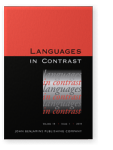Vol. 19:1 (2019) ► pp.106–132
Notions of “money” and “house” in the language consciousness of Russians and the Japanese
Cross-cultural research is crucially important in the modern globalized world where different cultural notions clash and interact. This article sheds light on the notions “money” and “house”, which represent attitudes to property, in the perception of Russians and the Japanese. The research method is an association experiment that allows to explain the grounds for mutual understanding or possible misunderstanding in the instances of interethnic contacts. Analysis of association fields formed on the basis of two Russian and one Japanese sampling shows that modern Japanese tend to perceive money as beneficial, while modern Russians tend to perceive it as something evil and related to governance. 21st-century Japanese respondents and 21st-century Russian respondents proved to be more work-oriented than their early 1990s Russian counterparts. Regardless of cultural differences, both Russians and the Japanese admitted their need of money as an indispensable element of modern life. A house is understood in both cultures as a place to live in, but 1990s Russians found it less cozy and comfortable than 21st-century Russians and the Japanese.
Article outline
- 1.Introduction
- 2.Association experiments as a productive research method
- 3.The social situation in Russia and Japan
- 4.Hypotheses of the study
- 5.Field study of association reactions
- 5.1Participants
- 5.2Data collection
- 5.3Data analysis
- 6.Money as it is viewed in Russian and Japanese cultures
- 7.House as it is viewed in Russian and Japanese cultures
- 8.Conclusion
- Notes
-
References
